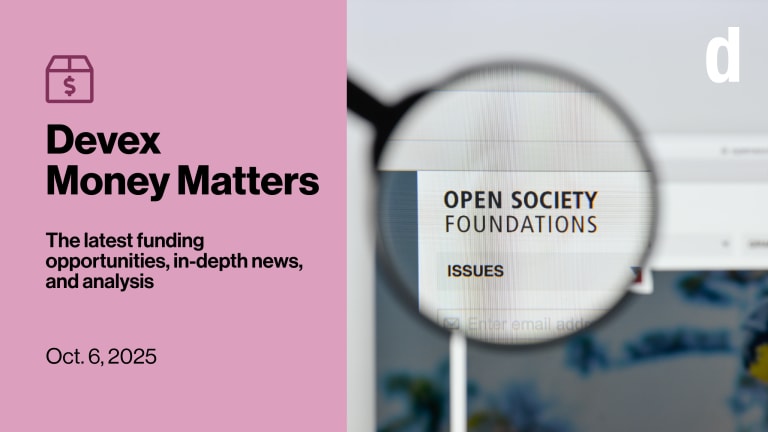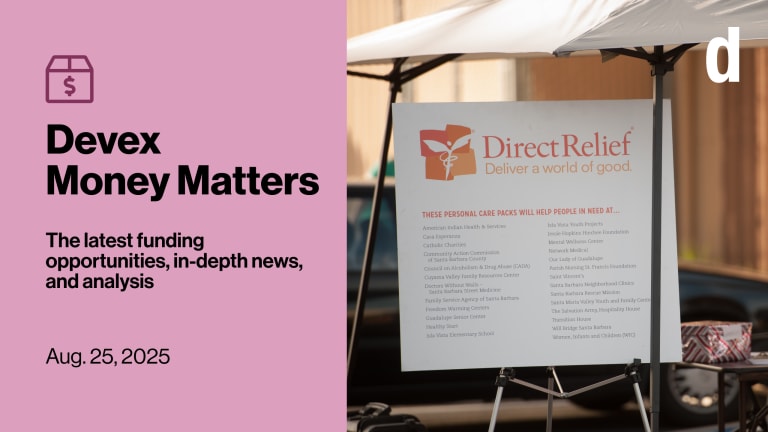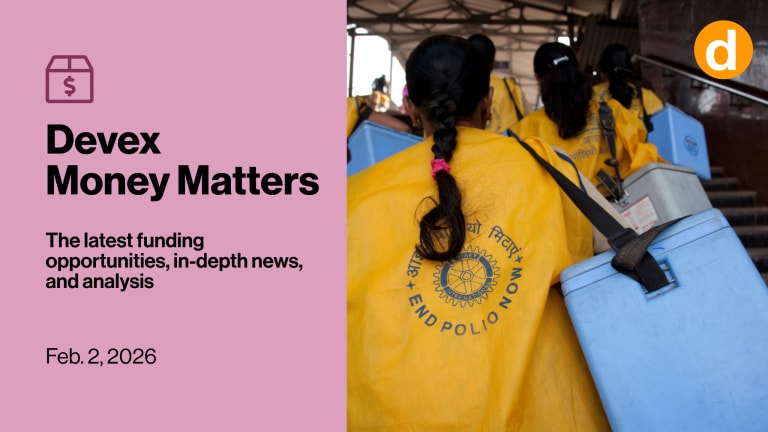
USAID has admitted that it is unlikely to hit its target of 25% local funding by 2025, and its local funding actually fell in the last fiscal year. We looked into the details of its contracting work to see what was going on.
+ Are there topics you want to read more about in Money Matters? We want your feedback.
Local losses
USAID’s total contract spending rose by around $600 million, to $6.8 billion in fiscal year 2023. But local contracting did not keep pace.
This is a preview of Devex Money Matters
Sign up to this weekly newsletter and get the latest in development funding in your inbox every Monday.
In fact, the amount of funding received by local organizations dropped by almost a quarter in dollar terms, from $288.3 million to $218.9 million.
In percentage terms, the fall was even steeper — a drop of around a third.
But who got the money?
Read: Interactive — Who won USAID’s local contracts in 2023? (Pro)
+ Not yet a Devex Pro member? Access all our exclusive reporting and analyses, data-driven funding insights, members-only events, and the world’s largest global development job board by starting a 15-day free trial today.
Funding activity
We publish tenders, grants, and other funding announcements on our Funding Platform. Here are some of the ones which have been viewed the most in the past 10 days.
The African Development Bank has announced $135 million for the modernization of the port infrastructure in the Union of the Comoros.
The Asian Development Bank has allocated $100 million to help provide cost-effective clean energy in India.
The Inter-American Development Bank has approved a $500 million loan to assist in stabilizing the money market in Ecuador.
USAID has opened a grant competition to bolster the irrigation and mechanization markets in Feed the Future countries.
USAID is also providing grants of up to $500,000 for climate change mitigation and adaptation projects worldwide.
+ Try out Devex Pro Funding today with a free five-day trial, and explore funding opportunities from over 850+ sources in addition to our analysis and news content.
Crown down
Earlier this month, one of the longest-standing U.K. aid suppliers closed its doors.
Crown Agents, which employed around 340 people, said in a statement that it had been struggling with a £50 million pensions deficit — equivalent to almost a year’s revenue — as well as cuts to British official development assistance, and a frustrated contract in Ukraine.
Devex had previously exclusively reported that the company was expected to close.
Many of its largest contracts have been transferred to new providers, along with many employees. Other staffers are waiting on unpaid wages.
Read: Crown Agents shuts down (Pro)
Background reading: Crown Agents faces collapse (Pro)
+ Your Devex Pro membership lets you get the most out of our U.K. aid sector coverage.
New cuts — just like the old cuts
The new Labour government in the U.K. plans to transfer almost £1 billion from the Foreign, Commonwealth & Development Office’s budget to pay for housing asylum-seekers — a controversial practice Labour criticized before winning July’s election.
While the move is not officially a reduction in ODA, it means FCDO’s aid budget is set to be £8.31 billion in the 2024-2025 financial year — £700 million less than the previous year.
There remains some possibility of additional funding when the U.K. government sets its budget for the year in October.
Read: UK Labour makes fresh aid budget cuts within weeks of taking power
Toxic environment
It’s been a tough few months for U.S.-based nonprofit Women in Global Health, which has seen a series of high-profile departures after accusations of racial discrimination and toxicity.
The organization, founded in 2015 as a volunteer-led movement to challenge “power and privilege in global health,” grew rapidly to have an annual budget of $3.7 million and 58 chapters globally, accounting for about 6,500 members. But a whistleblower complaint led to the departure of co-founder and Executive Director Dr. Roopa Dhatt.
Outrage then followed when a man was appointed as interim board chair. Insiders said that “deep, deep troubles” had been brewing for some time.
Exclusive: Probe finds Women in Global Health had ‘toxic’ environment
Digital divide
USAID has released a new digital policy to guide its approach to digital technology over the next 10 years.
“It’s clear we stand at the cusp of another technological upheaval that none of us really can predict,” said USAID Administrator Samantha Power at the policy’s launch event last month.
Read: USAID unveils a new digital policy to drive the next decade (Pro)
Interested in more business and funding coverage? Explore our business overview page. If you're a Pro subscriber, you can set up news alerts for funding articles. We suggest selecting "Funding" as the topic, along with keywords (e.g. USAID). Not a Pro subscriber yet? Try a 15-day Pro trial.
Sign up to Money Matters for an inside look at the biggest stories in development funding.








